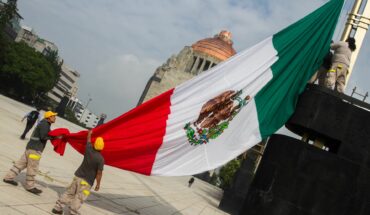After the categorical victory in the elections of President Gabriel Boric, the positive image of the President only rose. His first speech in La Moneda was the vehement proof of that, the applause that was seen in the streets and squares in his path, were also endorsed in the virtual space, where social networks literally exploded with every word of the Head of State. In its first month, however, and outside of the constant attack of a certain sector, self-styled Patriota, the digital image of the President began to fall and not because of problems in management, but because of errors in government political communication, according to a recent study by the Observatory of Politics and Social Networks of the Central University (UCEN).
Word cloud from the First Government Speech. Source: UCEN elaboration with data obtained from Prensa Presidencia
First and second weeks
The massive initial support, according to what was observed by the team of Professor Nicolás Freire, executive director of the Observatory, and what was reported to El Mostrador by the coordinators of the research Flavia Santos and Constanza Lara, the first week of president Gabriel Boric’s government stood out for various communication difficulties. In fact, the first day of government was marked by the statements of the President after the delay of the King of Spain Felipe VI to the ceremony of change of command, which produced an impact on diplomatic relations between the crown and the current government.
They emphasize that, during the same week, the coordination of a visit by the Minister of the Interior, Izkia Siches, to Temucuicui, was interrupted by different demonstrations, where she was even received with shots, finally preventing the meeting from taking place. “If we focus on what were the reactions to their government measures, we find facts such as the failed visit of Izkia to La Araucanía, which is grouped in the main themes of the four weeks of government and that are related to the issue of security, which generated great expectations regarding the measures on the dialogue that this government wanted to implement, and what has become more difficult than the account and has had an impact on its valuation in the digital area, “they point out from the observatory.
However, in the research supported by the UCEN, favorable milestones at the national level also stand out, such as the signing to ratify the Escazú Agreement, the only environmental treaty in the region, to which Chile was not attached until March 18 with the signature of the current government, and the appointment of Faride Zerán as president of the National Television Council (CNTV), who is a journalist with National Award and Vice-Rector of Extension and Communications of the University of Chile.
“There was a specific policy that generated noise in the digital space, which was the signing of the Escazú treaty on March 18, which had a transversal support of both citizens and political sectors, so it was a very important event in social networks in favor of the government,” they told this media from the coordination of the study.
Meanwhile, during the second week of Gabriel Boric in La Moneda, the announcement of the amnesty project for political prisoners was made, one of the commitments of his presidential campaign. Likewise, the appointment of Bárbara Figueroa as ambassador to Argentina, a fact that caused a stir both in the opposition and in public opinion, even added controversial opinions from the other side of the mountain range.
Regarding the consolidation of the government bloc, which in the opinion of the researchers seemed a long-term project rather than a tangible reality, had its climax in the political division caused by the support for the fifth withdrawal of pro-government congressmen, such support seemed to go against the proposals and visions of the current mandate, which was later ratified with the publication of “Chile Apoya”, the economic recovery plan.
“As for what most affected the President in his digital image, we found different events that did not necessarily have to do with his political agenda, but with other issues such as the fifth retreat, which was widely disseminated on social networks. On the other hand, there were communication errors of the same members of his cabinet, which generated a difficulty in communication and in the arrival to the citizenship, “they sentence from the observatory of the UCEN.
In this sense, the board in Cerro CastWith his ministers and parliamentarians of Apruebo Dignidad and Democratic Socialism, he was key to directing the political forces and giving a new legislative course, characterized by the union between the left and the center left. Consequently, this day managed to maintain presidential approval, despite the fact that there was an increase in rejection towards a not so modest 30%.
Third week and The Hague
As for the third week of government, he highlighted the dispute with Bolivia in relation to water rights over the Silala River, a situation that dates back to 1996 when the highland country denied the quality of an international river. Currently, Chile’s application to the International Court of Justice is in line with this recognition.
Regarding the above, international conflicts usually have positive effects on the approval of the leaders, however, in the case of the current head of state, there is a decrease in their approval and an increase in disapproval.
“When we talk about the current government and The Hague, from our institution we see the impact that there is in social networks, on this we can say that regarding the study we carried out on President Boric, he was not positively affected by the issue of The Hague. First, because obviously there is an interference of other issues such as the fifth withdrawal and communication errors, which limited the positive impact that the issue of The Hague could have, in addition to the fact that if we consider that there is a whole articulation of sectors critical of the government such as the right or sectors that were articulated around the demand for the fifth withdrawal, that became more transversal and that fed these negative aspects. On the other hand, Chileans in relation to the health crisis and issues related to The Hague in a general context, we already know that former President Piñera generated recoveries in the polls, in addition former President Piñera put above all the protection of the territorial limits of Chile. Therefore, people were afraid of losing territory.”
In relation to the last week of his initial month in government, the current President made the first international visit to Argentina, where he was received by President Alberto Fernández, with whom he addressed issues of Latin American union, in addition to the challenges to face the climate, migration and energy crises.
On the national context, on April 25 the march convened by the Confederation of Students of Chile (CONFECH) was carried out with the aim of increasing the balance of the Higher Education Food Scholarship (BAES) and the resignation of the director of the National Board of School Aid and Scholarships (JUNAEB). As a result of the above, a favorable announcement was made to the demands, increasing by $5,000 the balance for this year and next through the 2023 Budget Law.
In summary, in line with what was observed by the UCEN researchers, the first month as President resulted in 44% approval and 41% disapproval, which, in relation to the first week of government, shows a different scenario than what he expected before taking office.
Security and governance
The research of the Observatory of Politics and Social Networks of the Central University (UCEN) also focused on the digital conversation about the President of the Republic and some of his ministers.
“What we did was to evaluate the activation of audiences in the digital political territory, and this activation of audiences respond in a much more spontaneous way and much more linked to the conjunctural, and that is why there is a greater polarization to what happens in the surveys,” they argue from the UCEN.
They add that there is no opinion that is manifesting, but rather that there are audiences that are being activated. In this sense, they clarify, “although we see that in this month of government week by week there is a decrease in the image of the president, there is another thing that we must highlight, and that is the fact that in social networks they are much more changing before this opinion.”
From the university observatory, which constantly monitors social networks, they point out that “between now and next week there may be issues that greatly raise what is the activation of audiences that are closer to the President”, therefore they pose an objective and challenge for the communications departments of the Government: “they have to put a greater emphasis on what these communication strategies are and how to reach citizens”.
Word cloud of government trends. Elaboration of the observatory with data obtained from Trendinalia.
In addition to the topics mentioned above, government actors have positioned themselves within the top 10 daily trends during the first month of government.They highlight the same President, more mentioned in the digital political territory as Boric, followed by his partner, the first lady Irina Karamanos. Some of the ministers are not left out, and it is Izkia Siches, Giorgio Jackson and Carlos Montes who position themselves more time in trend in Twitter conversations.
During the week of March 11 to 16, the tone of their conversation on Twitter refers to the change of command, even positioning hashtags such as #CambioDeMando and #11deMarzo, where the relationship of 72% with the issue of governance is evident, because in these Internet trends in addition to commenting minute by minute what happened in the ceremony, generated comments of expectations about the new government.
On the other hand, other topics mostly addressed in the President’s conversation are related to Corruption (6%) and Security (3%).
Assessment and Categorization first week Gabriel Boric.
These topics position President Gabriel Boric with a 71% activation of positive audiences during his first days in office.
In the second week of government, from March 17 to 23, you can see a major change in his approval, which drops from 71% to 19% compared to the previous week. This is influenced in HR. SS -among other topics- mainly by two themes: Governance (40%) International Relations (15%) and Security (11%).
Assessment and Categorization second week Gabriel Boric.
The two antecedents that mark the refusal given of the assessment in the second week of government are related to the issue of security, which is mainly linked to tweets that refer to the measure taken on the pardon of prisoners of the revolt of the social outbreak. In addition, the appointment of Bárbara Figueroa as Chile’s ambassador to Argentina is added, which was confirmed in a wave of negative criticism on Twitter.
Rating and Influencers Bárbara Figueroa.
As shown in the image above, the negative assessment of the figure of Figueroa marks a trend in the assessment of the president during his second week in office, showing some opponents, such as former presidential candidate José Antonio Kast
In the same context, the week of March 24 to 30 shows a consecutive trend towards the disapproval of the current president rising 5 points in his negative conversation since last week.
Issues such as the fifth withdrawal of AFP funds take a great preponderance in the digital conversation, they say from the UCEN observatory, generating rejection in Internet users for opposition to the withdrawal by the government. The issues of governance and security were also accentuated during 03/29, due to the altercations that occurred during the day of the “young combatant”. From this arise criticism of governance and public security.
During the last week of the first month of government, the conversation in the digital political territory is marked -again- by the activation of critical audiences.
The topic of lack of security (11%) stands out, which was marked by the conversation about the conflicts in the Araucaria and surroundings; unleashing violence and illegal seizures of land with weapons. In relation to International Relations (16%), there was both criticism of Boric for his trip to Argentina, and conformity after the approval of the Escazú Agreement. However, negative opinions towards the president increased because of the refusal to the fifth withdrawal of pension funds.
Ministers Benado and Jara in the digital arena
According to the research of the Observatory of Politics and Social Networks of the UCEN, Minister Alexandra Benado was the first head of portfolio analyzed during the initial week of government, showing broad support for her management from the digital space, grouping 74% of positive audiences being these directed to her ministerial work.
The main topics of approval revolve around the new proposals and projects presented by the minister added to the celebrations for the representation of an expert in the area, being an athlete and teacher of these topics.
Along with the above, within the digital political territory there is a particularity: by generating an analysis of followers on the platform that the Minister of Agriculture Esteban Valenzuela (11,829) and the Minister of Science Flavio Salazar (7,953), are the ministers with the lowest number of followers on Twitter. In this way, this graph shows its evolution, along with the peaks of followers and their possible causes in the social network:
Evolution of twitter followers of Minister Alexandra Benado.
The first peak was found on March 19, where she celebrated the entry of “La Roja” U-17 women to the World Cup in India. This publication reached thes 66 Retweets and 725 likes, being one of his most recognized publications by Internet users.
On the other hand, the tweet published on April 1, the date on which the law that professionalizes women’s football is promulgated, reaches 28 Retweets and 229 likes, this fact being one of the most commented on in her management in the ministerial work of her first month as Minister of Sport.
Finally, as of April 11, her account is counted with 11,987 followers on her personal Twitter and with a positive trend, which possibly generates an escalation of followers and attention of audiences in her work as a minister.
The second week of Gabriel Boric’s term was marked on Twitter by the presence of conversations around the fifth withdrawal of pension funds from the AFPs, this being one of the reasons to evaluate the head of one of the influential portfolios on this subject, the Minister of Labor and Social Welfare.
Jeannette Jara gathers an important level of conversation about her work as a minister during the first 15 days of government (94%). Most of the audiences that talk about the head of the Ministry do so in a positive way (51%)
Continuing the analysis, Jeannette Jara, Minister of Labor and Social Welfare, was the only one of the four portfolio heads – analyzed in this report – who suffered a loss of followers.
Evolution of Twitter followers of Minister Jeannette Jara
What happened in your broadcast on the day you saw a decline in your followers? on March 19, after a greeting to the masters of construction that reached the figure of 20 Retweets 137 likes. “This day is where the minister obtains a fall of 12 followers which, may or may not, be linked to this fact, but the reactions of the audiences do not contribute to this assumption, because, the publication of the minister was celebrated by workers in the area.”
Subsequently, on March 22 he had a peak of 283 new followers, where his most relevant publication reached 196 Retweets and 464 likes, with an intervention in the Labor Commission and calling for tranquility about pension funds.
Also, the following day he achieved an increase of 122 followers, after a publication with NO+AFP leaders with 37 Retweets and 146 likes.
Finally, April 1 was his last peak of 101 followers, highlighting a Retweet of President Boric and his allusion to a true social security system. That post had 18 Retweets and 81 likes.
Ministers Muñoz and Ávila do not lose followers
The third week of the current government is marked by different cases of complaints of harassment and possible kidnappings of women, adolescents and students in locomotion such as the Santiago metro and the network buses, which activates conversation about safety in public transport, placing among other actors the Minister of Transport and Telecommunications, Juan Carlos Muñoz.
Assessment and Categorization Minister Juan Carlos Muñoz
The minister’s assessment shows a slight trend towards the negative, his positivity being low, but marked by 38% of neutral comments, which focus on proposals to improve safety in public locomotion and also on news about the facts and complaints mentioned above.
On the other hand, although his stability in the sensitivity of audiences in the digital political territory was slightly disadvantaged, this was not the panorama in the analysis of his followers on Twitter, being the minister with the highest number of peaks of followers.
Evolution of Followers on Twitter of Minister Juan Carlos Muñoz
The first of these took place on March 18, with 245 new followers. The publication of the date was related to the Escazú Agreement, which produces a coherent line in its issuance on the social network, since the minister has been interested in proposals that transfer public transport to sustainable transport and with responsibility for the environment. Therefore, Internet users generate positive comments towards the support of the agreement, the publication reaches 945 likes.
On March 22 he increases 236 followers, while sharing an interview where he urges the use of bicycles and public transport, achieving 208 Retweets 1,325 likes.
On the other hand, on March 28 it reaches 708 Retweets and 4,168 likes in a post about bicycle use. That same date it increased to 188 followers.
The “ciclorecreovía” of Viña del Mar was the tonic of April 5, achieving 24 Retweets and 284 likes and increasing 139 followers. The publication shows the support of the minister towards the initiatives in terms of the same line that he has been showing in his communication on the social network, since the support for this type of initiatives summons the idea of moving to cycling as one of the proposals of transport itstentable. Also shown in this publication is an interaction with the mayor of Viña del Mar, Macarena Ripamonti and their work together.
In the fourth week that concludes the first month of government, there were important events, including the 15% increase in the JUNAEB State Scholarship, and also the news declared by Marco Ávila, the Minister of Education, about the cancellation of the historic debt of the CAE and a process of transition to a new financing system in higher education. All these events generated that in this last week the head of education activated audiences during these days.
Ávila faces a negative trend on the part of Internet users, reaching 55% and 18% of positive evaluations. As for his ministerial work, the audiences are divided between those who talk about personal aspects of the minister and those who generate conversation about the proposals and actions carried out by the ministry, in the latter category it became relevant to identify the main topics to which Internet users allude, being the “Violence” the most present theme with 30% this due to the different threats of “School massacre”.
At the same time, when assessing the Ministry of Education, the positive audiences exceed those of the minister identifying a coherence in the conversation about the holder and his ministry, with the theme “Violence in Education” being the second with the greatest presence in the conversation reaching 26%.
As has been evidenced, the minister has had to overcome criticism of his management and address the problem of violence in educational institutions. Despite this, it is the second with the highest number of follower peaks:
The first of them is on March 18 with 220 followers, with a tweet referring to the notice about the signature of Escazú, although it is not one of the topics addressed by the ministry, Internet users value the support being part of the government.
On the other hand, on March 21 it added 227 new followers, the same date on which it tweeted about the work done with MINSAL in relation to health and educational guidelines for schools. This reaches 134 Retweets and 288 likes, where there are interactions that recognize the joint work of the ministries, highlighting the cooperation and coordination of the teams.
On March 24, he added 155 more people to his personal profile, where his publication with the greatest reaction was the preparation of the intervention strategy to address situations of violence within the establishments, a topic most alluded to in his conversation on the social network.





